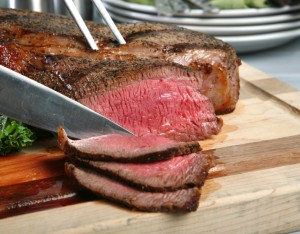The American Meat Institute has commented on FSIS’s proposed new rule to label mechanically tenderized beef, stating that they are opposed to labeling because “the food safety risk associated with mechanically tenderized beef products is very low and does not warrant the proposed labeling.”
 Consumer Reports states that there have been at least five outbreaks of E. coli O157:H7 linked to mechanically tenderized beef between 2003 and 2009, causing at least 174 illnesses and killing one person. And since those cases are drastically underreported, making the multiplier for E. coli as large as 27, that means 4,698 people may have been sickened in those outbreaks. And last year, there was an E. coli O157:H7 outbreak in Canada linked to mechanically tenderized steak that sickened 18 people. In addition, Consumer Reports says that 37% of slaughterhouses use mechanical tenderization, but federal meat inspectors are not testing these products for E. coli, in spite of the fact that USDA’s Office of the Inspector General stated that “these products present some addition risk for E. coli contamination.”
Consumer Reports states that there have been at least five outbreaks of E. coli O157:H7 linked to mechanically tenderized beef between 2003 and 2009, causing at least 174 illnesses and killing one person. And since those cases are drastically underreported, making the multiplier for E. coli as large as 27, that means 4,698 people may have been sickened in those outbreaks. And last year, there was an E. coli O157:H7 outbreak in Canada linked to mechanically tenderized steak that sickened 18 people. In addition, Consumer Reports says that 37% of slaughterhouses use mechanical tenderization, but federal meat inspectors are not testing these products for E. coli, in spite of the fact that USDA’s Office of the Inspector General stated that “these products present some addition risk for E. coli contamination.”
Consumers are willing to pay more money for cuts they believe are more tender. At Costco, for instance, all of the steaks except filets and flank are blade tenderized, but that company notes that fact on the label.
Instead of labeling, which would inform consumers that blade and needle-tenderized beef should be cooked to well-done, the Institute says that the “industry should be encouraged to use prevention technologies and Good Manufacturing Practices to make the product as safe as possible.” Instead of focusing on the actual numbers of ill persons in the outbreaks, AMI took the opposite approach, stating that “risk assessment predicted one illness in 14.2 million servings for MT steaks.” Of course, that means little to those sickened by undercooked MT steaks.
And this is an interesting point: in a footnote, the Institute states that “admittedly, not all processors may use the latest methods to produce mechanically tenderized or marinated products in a manner that eliminates or minimizes the likelihood of E. coli O157:H7 being present. For that reason, the agency could consider a labeling option for processors that are not able to state that E. coli is not reasonable likely to occur because they do not utilize some effective combination of high event programs, fabrication intervention, and continued use of processes or procedures associated with recalls.”
Food safety and consumer groups support the new labeling rule. The Consumer Federation of America states that, “Without labeling, consumers would never know that the steak they are purchasing has been mechanically tenderized and may present a greater risk for foodborne illness.” And the Center for Science in the Public Interest says that “USDA’s new requirement that the meat industry label cuts of meat that have been needle- or blade-tenderized is a common sense remedy that can protect consumers. USDA should accelerate the requirement and make labels mandatory by January 2014.”




